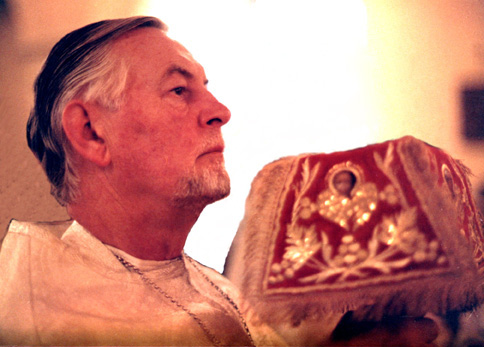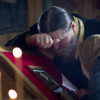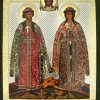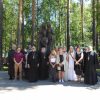My first encounter with Fr. Alexander was a trip to St. Vladimir’s Seminary for Orthodox Education Day. This was a yearly celebration in early October when the seminary would open its doors and facilities to the public and invite everyone to come and visit. There would be various ethnic food booths, books and religious articles for sale, church services, activities for children and entertainment for all, from amazing Georgian dancers and singers to melodious and talented church choirs. The day would have a special theme and a keynote speaker (one of the last ones that I attended the theme was “Icons and Ipods” and the speaker was Fr. Tom Hopko (+of blessed memory).
I was still in high school and I was accompanied by my parents. It was a cloudy and rainy day. The festival always went on, rain or shine. It was the early 1970’s. I had already made up my mind that after graduating from high school I wanted to apply to the collegiate division of St. Vladimir’s (or “St. Vlads” as the seminary is commonly called).(1) Imagine someone that you greatly admire and have seen and heard about only from afar through books or films. It could be a famous actor or entertainer, it could be anyone.
One day this famous person that you love and are in awe of is actually standing in front of you in the flesh. This was my experience. I had read “Of Water and the Spirit,” Fr. Alexander’s latest book, gifted to me by my parish priest Fr. Michael Koblosh. I had watched Fr. Alexander on television when he appeared on an episode of “Firing Line” with William F. Buckley, Jr. As I gazed at Fr. Alexander in person for the first time, he was very animated, exuberant, talking, smiling. He was walking alongside His Beatitude Metropolitan Ireney. They were both dressed in white. I just stood in awe at a distance and watched him with wide eyes.
I am a very shy person. My father is the opposite. He has the gift of sociability and he is not shy at all. He asked me, “Do you want to meet him?” My father is not intimidated by anyone because of their social position, status or fame. He’ll talk to anyone and is always personable and pleasant to speak with. I was horrified and answered “No, thank you, not right now.” I needed to first warm up a bit more before actually speaking with him. Meeting him would have to wait until another time. I was not quite ready for that just yet. My first visual impressions were that he was tall and handsome. He did not appear old to me, despite his grey and silver hair and goatee. Actually, they seemed to actually accent his appearance even more and made him more handsome. He was erect and straight and had good posture. He carried himself with self-confidence. He was not overweight or too thin but just right. He was my hero and I was grateful and happy to be able to see him for the first time. I could hardly wait to actually begin to study at the seminary and I was counting the days. It was my great dream and desire.
Finally the first day of seminary arrived. I actually met Fr. John Meyendorff before I met Fr. Alexander. Fr. Meyendorff was another theologian that I was in awe of and greatly admired. Father saw that I was a new student. He walked up to me, smiled, offered me his hand and said, “I’m Fr. Meyendorff.” That reminded me of Elvis Presley. Everyone in the world knows who Elvis is, yet he would humbly introduce himself to people by offering his hand and saying, “Hi, I’m Elvis Presley.” No kidding!
There was an assembly that day with all the new students in the Antony Bashir Auditorium in the Germack building. Fr. Alexander spoke to us behind a podium. He had each of us stand and introduce ourselves and say which parish we came from. I was from Holy Trinity in East Meadow. Fr. Michael Koblosh, my parish priest, greatly admired and liked Fr. Alexander. Fr. Alexander enjoyed visiting with Fr. Michael and shared time with him and his family from time to time on a personal level. They were friends. When I mentioned that I was from Holy Trinity, Fr. Alexander glowed with a nice smile and bowed slightly in acknowledgment and approval. It made me feel really good and accepted.
When Fr. Alexander entered a room everyone knew it. He had such a powerful charisma, that a surge of electricity would fill the room with his presence. You could have your back to the door, but you knew that he had come in. I loved listening to his voice. He had a Russian accent (Russian was his first language), but it in no way detracted from one’s ability to understand him and it actually added to the character of his individuality and uniqueness.
The timbre of his voice was deep and resonant. It was as if he had a small stereo in his voice box. When he served his voice was equally mesmerizing. Being in the congregation when he served, and especially serving in the altar with Fr. Alexander was an extraordinary experience. You could see and feel his great devotion, faith, joy and love, especially when he served the Divine Liturgy. Fr. Alexander’s knowledge, insight and wisdom, not only in theology but in literature, philosophy and so many other areas was as deep as the ocean. However, his forte and specialty was liturgics, especially the Holy Eucharist. His last great opus which he never actually finished (2) was on the Eucharist. Fr. Alexander’s huge influence in this area was his former professor from St. Sergius Theological Institute in Paris, Fr. Nicholas Afanasiev (3). Many people have a grossly incorrect notion about Fr. Alexander. They consider that he was liberal and innovative when it came to liturgics. Actually, the truth is that Fr. Alexander was quite the opposite. He was actually very conservative when he served and did not innovate or change or delete anything from the services.
Sometimes his former students would innovate how they did the services (without the proper blessing from their hierarch) and they would say that they learned this from Fr. Alexander. When Fr. Alexander would hear such stories, he would always say, “I never told them to do that.” This does not mean that Fr. Alexander was stuck in 19th century Russian liturgics and opposed to any correction or change that might be necessary. To truly understand Fr. Alexander’s theology, insights and opinions on liturgics, I would recommend reading his classic, “Introduction to Liturgical Theology”, SVS Press, Crestwood, NY, reprinted 2003. I would note at this point that liturgical reform was one topic scheduled for discussion at the Great Council of the Russian Orthodox Church which met in 1917. It would have been interesting to see the results of their deliberations, but unfortunately, as we all know, the council was cut short by the Bolshevik revolution. When Fr. Alexander wrote, in Russian or in English, it was perfectly grammatically correct. Yet it was unique and nothing like anything I had ever seen or read before by anyone. It was almost as if it was his own unique language and way of communicating like nobody else ever had. I had to concentrate and struggle very hard to grasp the genius and lofty thoughts that he translated from his incredible mind and thought onto a piece of paper in the form of the printed word.
Here are some stories and anecdotes about Fr. Alexander which reveal his humor, wit, kindness, faith and generosity:
(Told by Fr. Thomas Hopko, (+of blessed memory), son-in-law of Fr. Alexander, professor and future Dean of St. Vladimir’s: “At one time there was a popular pattern for vestments that had printed all over the fabric, with crosses, the abbreviated Slavonic word for God (БГЪ). One time I was serving with Fr. Alexander, and as we were putting away our vestments, I asked him, “Father, isn’t that kind of strange, to have ‘God’ ‘God’ ‘God’ printed all over the vestments like that?” Fr. Alexander replied, ‘Tom, be glad it doesn’t say OCA.’”
(Told by Fr. Michael Koblosh): “I happened to be at St. Tikhon’s Monastery when the Synod of Bishops was having a meeting. I ran into Fr. Alexander as he was exiting the meeting. Smiling and content, he walked up to me, gave me a hard but loving slap on the chest with the back of his hand and said, “Koblosh, I never knew that the Holy Spirit could work through all that horsesh*t!”
(Told by Fr. Alvian Smirensky (+of blessed memory): “This was when I was a seminarian and the seminary was still located in Manhattan and was using space at Union Theological Seminary. The rule was that there was no drinking of alcohol allowed by the seminarians. We sat down to dinner with Fr. Alexander. We were having steak. Fr. Alexander enjoyed a good steak. Father grew up in France and was very French in many ways. He squirmed in his seat for a while and looked displeased and uncomfortable about something. Finally he got up and said “Oh heck” and left. He returned with a bottle of French burgundy which he proceeded to pour for himself and everyone else present.
(Told by Fr. Alvian): “I was once driving with Fr. Alexander on the west coast. I was the driver. Suddenly we heard a police siren as a police officer proceeded to pull us over. I don’t remember what the infraction was, but I was worried. Fr. Alexander remained perfectly calm. He grasped his pectoral cross, smiled at me and said, ‘Don’t worry about anything’. He thrusted the cross towards me and said, ‘I believe in this’”.
(Told by Fr. Tom): “Fr. Alexander once said, ‘Tom, do you know what patience is? Patience is sitting in traffic on the Throgs Neck Bridge’ “(a bridge near St. Vladimir’s Seminary notorious for traffic).
(Told by Fr. Tom): I had a Slavonic copy of the the priest’s Book of Needs (Требникъ). In the section on Confession there are pages listing various types of sins. Some of the sins I had no idea what they were, so I asked Fr. Alexander. He looked at the page which I showed him and he said ‘Tom, you don’t want to know.’”
(Fr. Alvian): “Some of the seminarians imagined that some kind of a miracle was occurring with an icon of the Theotokos in the seminary chapel. This whole episode and its aftermath was creating something of an issue in the seminary as a devotion was forming around this icon. Fr. Alexander caught wind of this. He removed the icon from the chapel and placed it in a drawer in his office. Thus ended the existence and devotion to the “miracle-working icon.”
This one is capricious and impish, but it is still funny. The feud between Fr. Alexander and Fr. Florovsky is famous. (Fr. Alvian): Someone once asked Fr. Alexander why Fr. Florovsky wore a belt (Fr. Florovsky commonly wore an Anglican cassock with a leather belt around it. In Orthodox tradition, only monastics wear leather belts around their cassocks. Fr. Florovsky, of course, was a married priest). Fr. Alexander replied, “Because he’s impotent.”
During my first year at the seminary some scandalous and immoral behavior took place on campus. Whoever was involved was expelled. Rumors were circulating. Fr. Alexander called a special meeting of the entire student body. I had never seen this kind and caring man express anger like this before. I only recall the last words of his indignant tirade: As he slammed his hand on the podium in front of him, he exclaimed “I will not be the Dean of a pot smoking homosexual joint!” I was terrified and disturbed by this whole affair. A senior seminarian calmed me down and said, “As long as you behave and do the right thing, you have nothing to worry about.” Fr. Alexander could be very lenient and forgiving, but when necessary, he did not shy away from resolute strictness.
I grew up during what is often referred to as “the turbulent sixties.” I was not immune to assimilating some of the rebelliousness and youthful arrogance of that time. I went through some personal changes (which I very much regret today) after I visited an Old Calendar monastery which had gone into schism from the mother Church. I don’t like to criticize or judge them, so I won’t name them. They were always very kind and hospitable to me. But let’s say that after my visit a certain “zeal not according to knowledge” found a place in my heart.
After one and a half years at St. Vladimir’s Seminary I transferred to Holy Trinity Seminary in Jordanville, NY and graduated after three years. I was not cured of my erring ways at Jordanville, but the extreme patience, love, kindness and toleration of these holy monastic fathers nurtured me, helped me to graduate, and eventually I was cured of these particular spiritual ills. Ironically, when I expressed to Fr. Alexander my desire to transfer to Holy Trinity, he told me, “If you go there, then you will learn what real obedience is.” Fr. Alexander was real and genuine in every way. He had no pretensions or false airs. He was self-confident and brilliant beyond description. He was the real deal, as they say. He was who he was and he never pretended to be anyone or anything else other than who he really was.
Many geniuses lack patience with the average person, but Fr. Alexander, like Fr. Meyendorff as well, was never condescending but always spoke with kindness, love, respect and patience. This was my experience. A final story. Years later I was at St. Vladimir’s for ED Day (Orthodox Education Day). Fr. Alexander was already taken from us by God. I was sitting at one of the outdoor picnic tables having something to eat. The weather was sunny and wonderful. A woman whom I did not know sat across from me. She conversed with me and Fr. Alexander came up in the conversation. She mentioned that he introduced her to the man who became her husband. I never knew that Fr. Alexander ever played the role of matchmaker, but I am not surprised. To me he was like a superman who could do everything and anything, and do it well. She concluded her conversation with me by saying, “Fr. Alexander was a beautiful man.” To this day I can’t think of any better description of Fr. Alexander if I was forced to describe him in only a few words. “He was a beautiful man.”
_____________________________________________
Footnotes:
1.St. Vladimir’s Seminary is a graduate school of Orthodox theology. In the 1970’s, in order to give high school graduates an opportunity to begin studies at the seminary, a “Collegiate Division” was created. Students would matriculate in one of two nearby colleges: Iona or Concordia. The students would live at the seminary, be seminarians, wear the cassock, attend chapel, participate fully in the life of the seminary and also have jobs (obediences) at the seminary. We took a van to college every day. At the end of a full day of studies at college we returned to our home, the seminary. We took three courses at the seminary in the evening which were accepted for college credit by the college where we were matriculated. Today the “Collegiate Division” no longer exists and St. Vladimir’s functions solely as a graduate school of higher learning in theology.
2.Using Fr. Alexander’s notes, scholars finished the unfinished portion of Fr. Alexander’s book which was published posthumously as “The Eucharist,” SVS Press, Crestwood, NY, 1987.
3.See “The Church of the Holy Spirit,” Nicholas Afanasiev, University of Notre Dame, 2007.

















